
7 minute read
Creating confident drivers
by Ruralco
WORDS SUPPLIED BY VTNZ
SHARING CAR MAINTENANCE TIPS AND TRICKS WITH YOUR TEEN MOTORIST IS A GREAT WAY OF BROADENING THEIR UNDERSTANDING OF VEHICLES AND HELPING THEM TO STAY SAFE ON NEW ZEALAND’S ROADS.
Advertisement
WORDS SUPPLIED BY VTNZ
For many rural households it’s a welcome day when your young adult passes their ‘full’ test and becomes a licensed motorist. With the driving services of parents and friends no longer needed, the independence of a legally mobile teenager can be a game changer for the wider family unit. That lasts right up until they call you saying “I’ve got a flat tyre and don’t know what to do!”. Getting a driver’s licence is a significant milestone in your child’s life. Making sure they know some car maintenance basics will go a long way to help keep them safe on the road, ensure their vehicles stay in good working condition and provide the foundations for a competent and self-assured driver. With us now in Spring now is the perfect time to share some self-help tips with the drivers in your household. If your Warrant of Fitness (WoF) expired during lockdown or is now due, use these as part of your pre-WoF check before you take your vehicle into VTNZ for your next inspection:
Lights It’s still dark in the morning so check all the lights on your vehicle are working as they should. That includes testing your indicators, park lights, brake lights and headlights (full and low beam).
Windscreen wipers Wiper blades may need replacing particularly if they’ve had to clear a lot of rain or snow over Winter. Spray water and cleaning fluid on your windscreen and turn on your wipers. Between each sweep, check for patches or smudging on the surface. If these are appearing your wiper blades need replacing. Seatbelts Fully functioning seatbelts are essential for you, and your passengers, safety. To check a seatbelt is working correctly, pull it all the way out and then tug on it sharply to ensure it stops. Remember to do this on all the seatbelts in your vehicle including those that you don’t use often. Tyre tread The weather can get wet and wild in Spring. Tyre tread is critical as it creates traction between your vehicle and the road. The minimum tread depth on a tyre is 1.5mm. Show your teen the 20c coin check for checking their tyre tread. Get them to insert a 20c coin into the tread. If they can see the whole of the number on the coin, it’s time to think about a replacement tyre.
Oil Not having enough oil can cause increased wear to your vehicle’s engine or cause it to seize up. Oil levels can be checked using a dipstick. If the oil doesn’t reach the indicator mark on a dipstick, you need more oil.
Car boot Make sure your boot is empty and clear of any rubbish or clutter. The VTNZ Automotive Technician that carries out your WoF needs to be able to access the spare wheel in the boot and check that it’s in good working order. VTNZ is also committed to keeping you and your vehicles safe on your farm. In addition to 75 branches nationwide, we also have over 100 customer sites that serve the rural community carrying out vehicle safety inspections on farm vehicles and certain equipment. Give your local VTNZ a call today and check if an inspector works in your area.
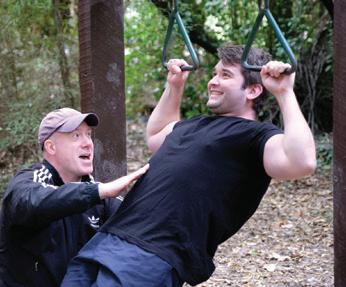
ACHING JOINTS, SORE BACK, UNEASY SLEEP AND RECURRING IRRITABILITY MAY ALL SEEM UNRELATED, BUT IN FACT COULD BE LINKED TO HOW THE BODY IS BEING FUELLED AND WHAT IT IS DOING OTHER THAN BEING PUSHED DAY IN DAY OUT TO KEEP WORKING ON THE FARM.
WORDS BY RICHARD RENNIE
Mind, body & soul approach can help heal
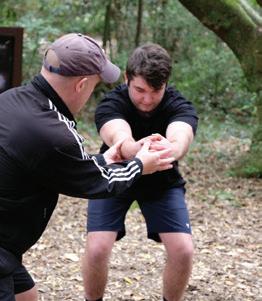
Ashburton based health advisor and rehabilitation expert Dave Green has joined the dots for many of his clients, teaching them how to link what they put into their bodies with the energy and well-being they exude from it. That in turn has an impact upon mental wellbeing, and general sense of positivity about life, work and family. “Working with clients I tend to take a massive overview, looking at everything they consume through a typical day, and from that you can see how it affects their body, whether it is or is not performing, and how they feel in themselves.” His dietary advice is far from rocket science, instead reinforcing the need to reduce or eliminate the usual suspects that plague western eating patterns, particularly alcohol, sugar, salt, and most processed foods. Dave’s experience in getting clients on a healthier track by starting with a dietary audit is that once a revamped diet is in place they experience less fatigue, less inflammation, greater clarity of thought and improved respiration. This will often come over a relatively short two-week period. For Dave setting a better dietary foundation for his clients provides the necessary springboard into shifts in physical exercise routines. “So often we see people focusing too soon and too much on the ‘physical’ side of their wellbeing improvement, often in big single hits of exercise that yields poorer results than they would like, for the effort they are putting in.” Mid-life males can be particularly bad for wanting to get into shape quickly by ‘going hard’ in bursts of activity that risk injury to bodies unaccustomed to intense exercise. “People get injured, feel demoralised and fall into a bit of a vicious cycle, getting depressed and even less motivated.” He tends to reinforce a “less is more” approach with his clients, and often works on 40–50% less time spent on physical exercises that are more easily fitted into a busy life. “Often you will only need half an hour, sometimes less, to achieve a
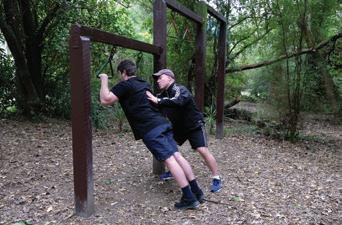
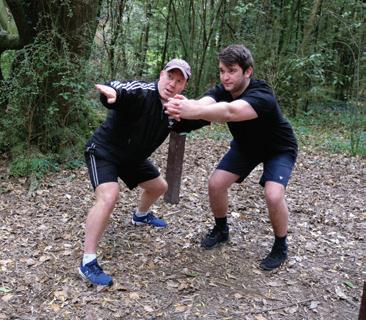
positive, healthy exercise experience.” Many farmers will be more than familiar with the constant ache of a sore back, hip or knee joint, and taking a holistic view on what their day comprises can help design approaches to improving those problems. “We look at what your lifestyle is, how much time you spend sitting versus moving about, along with your diet, and what foods you may be inflaming the problems with.” Flexibility is a big issue for many older males, while posture can also be an issue for modern farmers who spend plenty of time on quad bikes and tractors. One of Dave’s biggest successes came with a client who confessed to constant back pain for almost 40 years of his life. “Taking unusually heavy loads at awkward angles at high velocity had really taken its toll. We managed to get rid of it over two years.” Empathy and humility become two additional talents needed to help people step back from the painful places they often live in. Dave finds himself counselling the mind as much as the body to help clients shrug off the depression and anxiety often accompanying physical injuries. For farmers the prospect of committing to a gym may be impractical or impossible. Often the social environment it brings can be replicated in other group fitness with similar minded individuals. “Whatever the activity, it’s
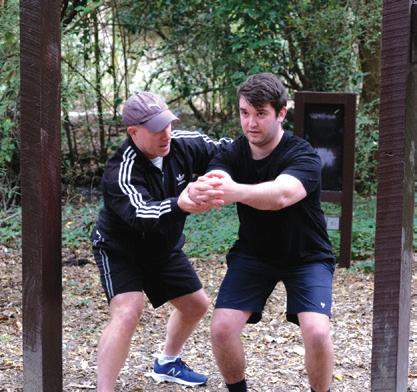
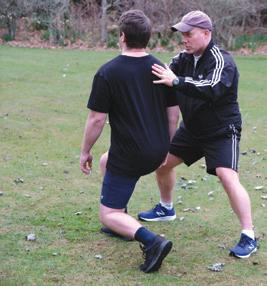
important to make it a habit and make it ‘your’ time, ditching the cell phone and gadgets, worries about the business or family, and giving something back to yourself.” He then points to good sleep habits and lots of hydration throughout the day to strengthen the efforts with exercise and diet. Dave has treated a wide spectrum of athletes, musicians and corporate clients over the years, and believes there are many farmers who recognise the need to deal with their physical problems and ensuing mental stress, but are not sure where to start. “There are plenty of simple exercises and practices you can do every day that will help reduce the fatigue and pain- and you don’t have to be limited by age, age is just a number and the body is a wonderful, complex thing capable of far more than we realise.” To learn more contact Dave Green: www.dghealthandfitness.com










